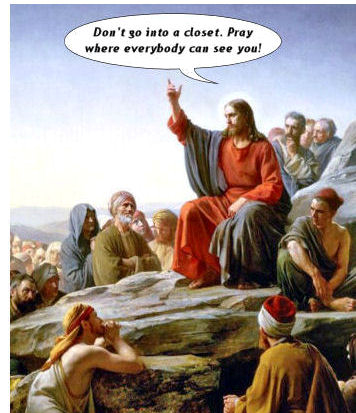
An illustration of the rhetorical device of irony…
The caption above is ironic because Jesus said exactly the opposite – literally – in Matthew 6:6. In the King James Version – the Bible that God uses – Jesus said in Matthew 6:6, “And when thou prayest, enter into thy closet…”
Matthew 6:6 is part of the Daily Office Reading (DOR) for Monday, May 19. The full reading was Matthew 6:1-6, and 16-18, which began with Jesus saying, “Beware of practicing your piety before others in order to be seen by them.” Instead, “when you give alms, do not let your left hand know what your right hand is doing.”
That passage gave rise to the common English expression, “the left hand doesn’t know what the right hand is doing.” And while the phrase is now “generally a term of derision for an organization where different members are pursuing opposing or contradictory goals,” in the passage in Matthew, Jesus arguably presented such “lack of coordination as an ideal.”
(So much for “strictly” interpreting the Bible.)
Jesus began on the matter of praying in public one verse earlier, in Matthew 6:5:
“…whenever you pray, do not be like the hypocrites; for they love to stand and pray in the synagogues and at the street corners, so that they may be seen by others. Truly I tell you, they have received their reward. 6But whenever you pray, go into your room and shut the door and pray to your Father who is in secret…”
That brings up the recent Supreme Court decision, Town of Greece v. Galloway. It prompted a blog-post by Frank Kirkpatrick of the Huffington Post, The Hollowness of Public Prayer. Kirkpatrick noted an alternative to trying to distinguish merely-ceremonial prayer from prayers with substance, as the Supreme Court seemed to do. “Far better to prohibit any and all prayers, substantive and ceremonial, from public gatherings. Let the faithful pray before they come to the meetings or afterwards or perhaps silently during them.”
Then there’s school prayer. One website said, “Perhaps no aspect of the church-state controversy arouses more emotion and discussion than the subject of prayer in the public schools.” See School Prayer: News – Secular Web, and School prayer – Wikipedia, the free encyclopedia. But see also Prayer in School Affects all of Society | Creation Today: “Since prayer was eliminated from public schools, the quality of education has shown a steady statistical decline. Is there a link between the two?”
(As to, “is there a link?” see Post hoc ergo propter hoc – Wikipedia, the free encyclopedia. Under that reasoning, it could be said since the Roman Empire collapsed shortly after Emperor Constantine converted to Christianity, that was the cause of the collapse, but we digress…)
To review: on the one hand some say that praying should be done in private, while others say that public prayer – especially prayer in schools – would both set a necessary standard for students, and prevent the declining morality that’s been so evident in the years since 1962.
But what does the Bible say?
We know that from the DOR Gospel for Monday, May 19, 2014, to wit, Matthew 6:6: “whenever you pray, go into your room [or closet] and shut the door…”
So what’s the “plain meaning” of this passage?
Christians who interpret the Bible “conservatively” – strictly or literally – should say that in a passage like this, the plain meaning of what Jesus said is perfectly clear. As one website said, “The Bible must be interpreted literally which is the way language is normally and naturally understood.” Or there is the Golden Rule of Interpretation: “When the plain sense of Scripture makes common sense, seek no other sense; Therefore, take every word at its primary, ordinary, usual, literal meaning…” See Do You Interpret the Bible Literally? – Middletown Bible church. (Or you could just type “Bible plain meaning” in your search engine.)
That should be the end of the story, if you consistently apply the strict and conservative “plain meaning” of the words of Jesus in Matthew 6:6. (See also, for example, “The Bible says it, I believe it, that settles it, God said it, I believe it, that settles it : Dictionary of …, or – in a YouTube version – Homosexuality & The Bible 1: God Said It, I Believe It, That Settles It …
But that great philosopher Henny Youngman might have summed it up best by saying:
“Take school prayer… Please!“

The upper image is courtesy of http://d8rew5imyp13e.cloudfront.net/blog/wp-content/uploads/2012/02/Jesus-Prayer.png. As to “alms,” see the Wikipedia article and/or alms – definition of alms by the Free Online Dictionary, …
On “the left hand doesn’t know what the right hand is doing.” See the Wikipedia article, Matthew 6:3 – Wikipedia, the free encyclopedia.
On “take school prayer…” This refers to a classic Henny Youngman joke. Youngman (1906-1998) was known for his one-liners, and his best-known was ‘Take my wife… please.’” Henny Youngman – Wikipedia, the free encyclopedia.
An FYI: The joke relied on the principle of dislocation, as used in comedy, but also in magic and the martial arts in general. See, Shinogi – Budotheory.ca, which mentioned three types of dislocation: positional, temporal, and functional. And a magician of course is also known as an illusionist. See the Wikipedia article, Magic (illusion) – Wikipedia, the free encyclopedia, and also Alex Davies – Dislocation. Finally, see The Internet Classics Archive | The Art of War by Sun Tzu, which noted the saying of Sun Tzu (q.v.), the ancient Chinese philosopher who said, “The fundamental principle of the Art of War is deception,” or in other words, dislocating your opponent.
So anyway, in the classic one-liner – told literally “a century ago” – the audience was led to expect Youngman to say “for example” when he began; as in, “Take my wife… for example.” But instead of saying “for example,” Youngman dislocated his audience by saying, “Take my wife… Please!”